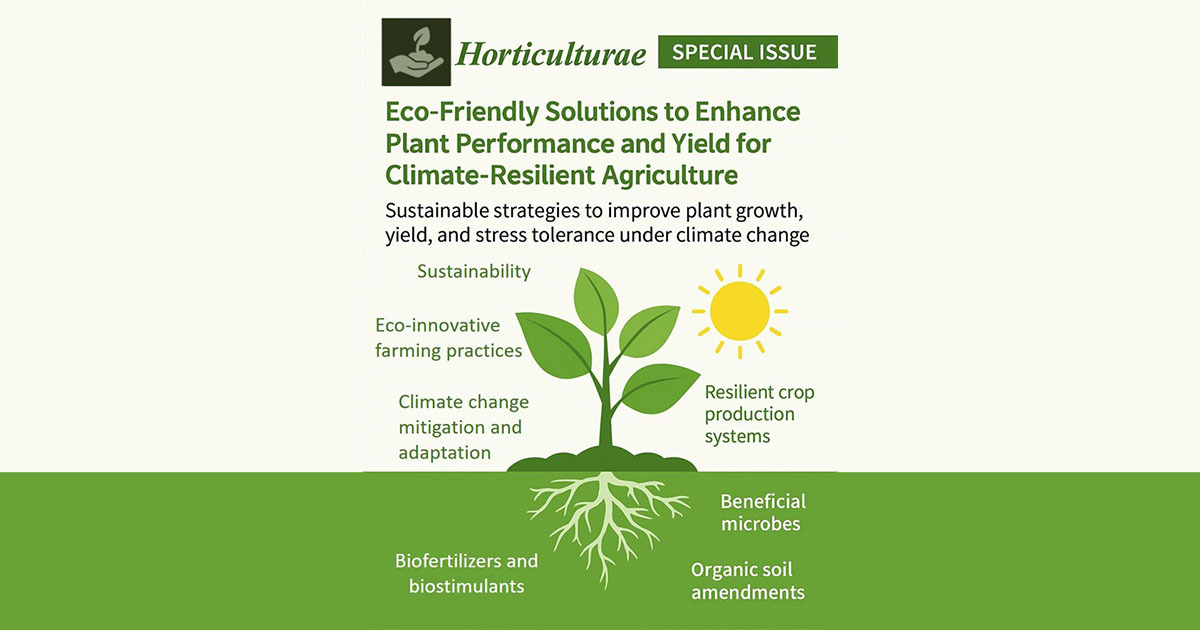- 3.0Impact Factor
- 5.1CiteScore
- 18 daysTime to First Decision
Eco-Friendly Solutions to Enhance Plant Performance and Yield for Climate-Resilient Agriculture
This special issue belongs to the section “Biotic and Abiotic Stress“.
Special Issue Information
Dear Colleagues,
The open access journal Horticulturae (IF: 3.1; Q1 in Horticulture) is pleased to announce that we have launched a new Special Issue titled “Eco-Friendly Solutions to Enhance Plant Performance and Yield for Climate-Resilient Agriculture”.
In the face of climate change, the global agricultural sector is facing the challenge of maintaining productivity while reducing its environmental footprint. Developing sustainable and eco-friendly strategies to improve plant growth, yield, and stress tolerance is crucial to ensure food security and agricultural resilience. This Special Issue aims to bring together cutting-edge research, reviews, and case studies focusing on innovative, sustainable approaches that promote plant health and productivity under climate stress. Multidisciplinary approaches that bridge agronomy, plant science, soil science, and environmental sustainability are welcome.
In particular, we encourage contributions on, but not limited, to the following topics:
- Sustainable agriculture;
- Eco-innovative farming practices;
- Resilient crop production systems;
- Climate change mitigation and adaptation;
- Circular agriculture;
- Biofertilizers and biostimulants;
- Organic soil amendments;
- Beneficial microbes.
Dr. Sandra Martins
Dr. Sandra Pereira
Guest Editors
Manuscript Submission Information
Manuscripts should be submitted online at www.mdpi.com by registering and logging in to this website. Once you are registered, click here to go to the submission form. Manuscripts can be submitted until the deadline. All submissions that pass pre-check are peer-reviewed. Accepted papers will be published continuously in the journal (as soon as accepted) and will be listed together on the special issue website. Research articles, review articles as well as short communications are invited. For planned papers, a title and short abstract (about 250 words) can be sent to the Editorial Office for assessment.
Submitted manuscripts should not have been published previously, nor be under consideration for publication elsewhere (except conference proceedings papers). All manuscripts are thoroughly refereed through a single-blind peer-review process. A guide for authors and other relevant information for submission of manuscripts is available on the Instructions for Authors page. Horticulturae is an international peer-reviewed open access monthly journal published by MDPI.
Please visit the Instructions for Authors page before submitting a manuscript. The Article Processing Charge (APC) for publication in this open access journal is 2200 CHF (Swiss Francs). Submitted papers should be well formatted and use good English. Authors may use MDPI's English editing service prior to publication or during author revisions.
Keywords
- sustainable agriculture
- climate change adaptation and mitigation
- bio-based products
- agro-industrial by-products
- plant stress tolerance

Benefits of Publishing in a Special Issue
- Ease of navigation: Grouping papers by topic helps scholars navigate broad scope journals more efficiently.
- Greater discoverability: Special Issues support the reach and impact of scientific research. Articles in Special Issues are more discoverable and cited more frequently.
- Expansion of research network: Special Issues facilitate connections among authors, fostering scientific collaborations.
- External promotion: Articles in Special Issues are often promoted through the journal's social media, increasing their visibility.
- e-Book format: Special Issues with more than 10 articles can be published as dedicated e-books, ensuring wide and rapid dissemination.

